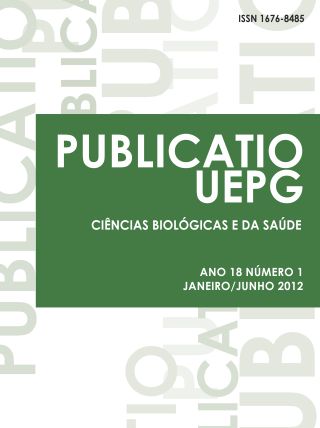Biossíntese e funções das lipoxinas na resolução da inflamação. Biosynthesis and functions of lipoxins in the resolution of inflammation.
DOI:
https://doi.org/10.5212/publicatio%20uepg.v18i1.4688Palabras clave:
Lipoxinas. Resolução, Inflamação, FPR2/ALX, Lipoxigenase.Resumen
A resolução da inflamação é um processo endógeno ativo, e as lipoxinas são importantes mediadores desse processo. Os derivados do ácido araquidônico são biossintetizados principalmente nas mucosas e vasos sanguíneos e atuam principalmente em um receptor acoplado à proteína G (FPR2/ALX) expresso em uma variedade de tipos celulares. As lipoxinas exibem um grande repertório de ações pró-resolução, como a redução da infi ltração de neutrófilos no local infl amado, diminuição da produção de superóxido e citocinas por granulócitos, ativação da fagocitose de microorganismos e de células apoptóticas por macrófagos, além de possuírem ações antinociceptivas diretas.
Palavras-chave: Lipoxinas. Resolução. Inflamação. FPR2/ALX. Lipoxigenase.
ABSTRACT : The resolution of inflammation is an active endogenous process, in which lipoxins are important mediators. Lipoxins are mainly biosynthesized in the mucosa and blood vessels, and they and they activate a G-protein coupled receptor (FPR2/ALX) which is widely expressed in several cell types. Lipoxins have several pro-resolution actions, such as the reduction of the infiltration of neutrophil in the inflammatory site, the decrease in the production of superoxide and cytokines by granulocytes, the activation of phagocytosis of microorganisms and apoptotic cells by macrophages. In addition, lipoxins display direct antinociceptive effects.
Keywords: Lipoxins. Resolution. Inflamation. FPR2/ALX. Lipoxygenase.
Descargas
Descargas
Número
Sección
Licencia

Este obra está licenciado com uma Licença Creative Commons Atribuição 4.0 Internacional.
Esta licença permite que outros distribuam, remixem, adaptem e criem a partir do seu trabalho, mesmo para fins comerciais, desde que lhe atribuam o devido crédito pela criação original. Este posicionamento está de acordo com as recomendações de acesso aberto da Budapest Open Access Initiative (BOAI).


